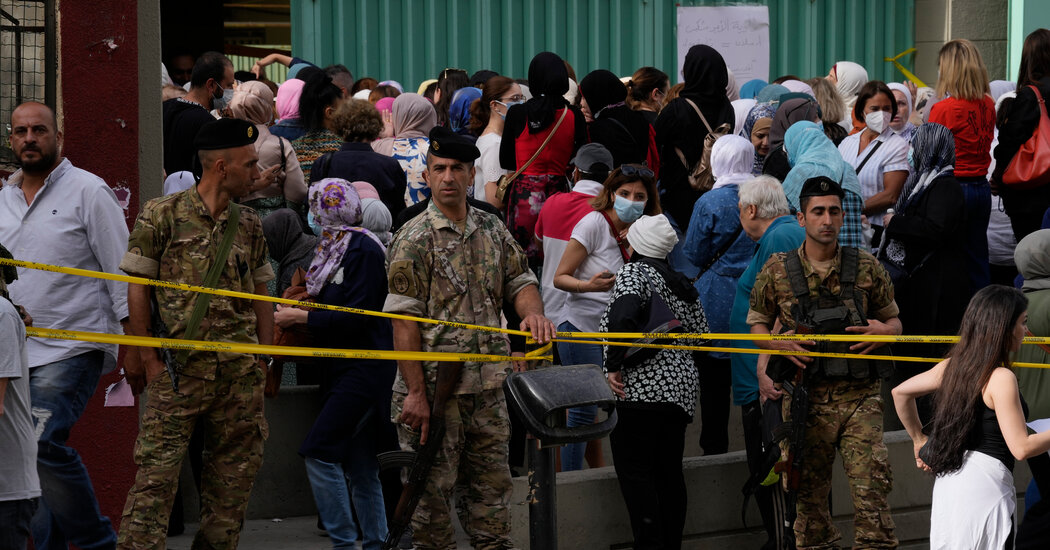
BEIRUT, Lebanon — After years abroad working as a school administrator, Anahid Jobanian returned to Lebanon to live off her savings for a simple retirement.
But that plan fell apart as the country collapsed.
Lebanon’s banks imploded, wiping out her savings. Prices for nearly everything soared, leaving her struggling to afford her heart and diabetes medications. And since the state almost entirely stopped producing electricity, much of the money she received from relatives abroad went to a generator to keep her power on.
“It’s like we are back to the Stone Age,” said Ms. Jobanian, 70.
So when she cast her vote in parliamentary elections on Sunday, her one goal was to vote against the political elite she accused of ruining the country.
“There must be a change,” she said.
It is hard to overstate how much worse life has gotten for the average citizen since Lebanon’s last parliamentary election, in 2018, and how little the country’s political elite have done to cushion the blow.
The vote is the public’s first opportunity to formally respond to their leaders’ performance, so at stake is not only who wins which seats, but the larger question of whether Lebanon’s political system is capable of fixing its many dysfunctions.
At polling places on Sunday around Beirut, the capital, few voters thought it was, at least in the short term.
The country’s complex makeup, with 18 officially recognized religious sects and a history of civil conflict, drives many voters to elect their coreligionists, even if they are corrupt.
And in a country where citizens seek out a party boss to cut through bureaucracy or get their children government jobs, corruption helps political parties serve their constituents.
But the collapse has put new strain on that old system.
The crisis began in late 2019, when protests against the political elite spilled into the streets of Beirut and other cities.
That exacerbated pressure on the banks, which had been engaging in creative accounting with the central bank to prop up the currency and earn unsustainable returns for depositors.
Critics have called it a Ponzi scheme, and it suddenly failed. The value of the Lebanese pound began a decline that would erase 95 percent of its value, and commercial banks placed limits on withdrawals, refusing to give people their money because the banks had effectively lost it.
The financial turmoil tore through the economy. Prices shot up, businesses failed, unemployment skyrocketed and doctors, nurses and other professionals fled for better salaries abroad.
The state, which had not provided 24-hour electricity before, ran so low on cash that it now supplies barely any at all, even to power traffic lights.
Making matters worse, a huge explosion in the port of Beirut in August 2020, also caused by gross mismanagement, killed more than 200 people and did billions of dollars in damage.
Despite losses that the government says total $72 billion, none of the banks have gone out of business, the central bank chief remains in his job, and none of the politicians who backed the policies that led to the collapse have been held accountable. Some of them ran in Sunday’s election — and are likely to win.
Many of the candidates are familiar faces who would struggle to bill themselves as agents of change.
They include Nabih Berri, the 84-year-old speaker of Parliament who has held that job for nearly three decades; Ali Hassan Khalil, a former finance minister who worked to hobble the investigation into the cause of the Beirut explosion; and Gebran Bassil, the president’s son-in-law, whom the United States accuses of corruption and placed sanctions on last year. Mr. Bassil denies the accusation.
Hezbollah, which has a substantial bloc in Parliament and is considered a terrorist organization by the United States, fielded a range of candidates. Others are warlords from the Lebanese civil war, which ended in 1990, or, in some cases, their sons.
Many voters are just fed up and have little faith that their votes will make a difference.
“We know they won’t change anything,” said Pascale Wakil, 35.
Caroline Wakil, 41, her sister, said their family had voted for candidates who had never held office before, even if they knew little about them. She did not expect many of them to win, or that those who did would accomplish much.
“We know that they are new, and we know they weren’t involved in what happened before,” she said.
Many of those running have ties to the financial system, which Olivier De Schutter, a United Nations expert on poverty, said shared responsibility for “the manufactured crisis” in Lebanon that had caused human rights violations.
“Lifetime savings have been wiped out by a reckless banking sector lured by a monetary policy favorable to their interests,” he wrote in a report published last week. “An entire generation has been condemned to destitution.”
On Friday, the Organized Crime and Corruption Reporting Project reported that a son of Lebanon’s central bank governor had transferred more than $6.5 million out of the country at a time when most depositors were locked out of their savings.
Those transactions were carried out by AM Bank, whose chairman, Marwan Kheireddine, bought a Manhattan penthouse for $9.9 million from the actress Jennifer Lawrence in August 2020, when Lebanon’s economy was plummeting.
Mr. Kheireddine has said the purchase was for a company he managed, not for him personally.
Now he is running for Parliament, and he told The New York Times in an interview that he wanted to use his experience to help fix the economy.
“I’m experienced in finance,” he said. “I’m not going to make promises, but I will do my best to work hard to get the depositors’ money back.”
Few voters had high hopes for their lost savings.
“The banks did not go bankrupt,” said Mohammad al-Berawi, 58, a shopkeeper. “They stole our money.”
Near where he sat, supporters of former Prime Minister Saad Hariri, who was the country’s most prominent Sunni Muslim politician until he quit politics early this year, had set up not one, but two inflatable swimming pools in the street to make it clear that they were not voting.
International election monitors did not immediately report major irregularities at the polls, but indications of cash for votes, directly or indirectly, were not hard to find. Some parties provided fuel so voters could drive to their districts; others distributed food vouchers.
Itab Rahme, 42, said she had been hired by Fouad Makhzoumi, a wealthy businessman, to help his campaign.
“He’s helping people either through food vouchers or with money,” she said.
Signs of the country’s dysfunction were common.
Prime Minister Najib Mikati, whom Forbes said this year was worth $3 billion, cast his vote in a center whose electricity had gone out.
“What matters is that there is electricity in the evening when they count,” he told a reporter as he hurried for the exit.
For many Lebanese, party loyalty remains strong.
“There’s no list more deserving of my vote than Hezbollah,” said Ahmad Zaiter, 22, a university student.
Many first-timers ran, too, marketing themselves as being cleaner and closer to the people. Most projections have them winning a limited number of seats in the 128-member Parliament, and analysts expect them to struggle without the infrastructure of a political party.
“I will be the people’s voice inside the Parliament, but I cannot promise that I will fix the electricity or the infrastructure,” said Asma-Maria Andraos, who is running in Beirut.
Many Lebanese who have the means have already left the country, and many more are seeking ways out. A recent poll by the research group Arab Barometer found that 48 percent of Lebanese citizens were seeking to emigrate. For those 18 to 29, the percentage rose to 63 percent, the poll found.
Fares Zouein, who owns a Beirut sandwich shop, said he intended to vote for his local political boss, whom he refused to name, because the man uses his position to help the neighborhood.
“That’s our problem in Lebanon: If you don’t have someone to help you, you’re stuck,” said Mr. Zouein, 50.
He, too, had little faith that the election would make life better.
“This is why everyone in Lebanon has three goals in life: to get a second passport, to open a bank account abroad, and to send their children abroad for school,” he said.




